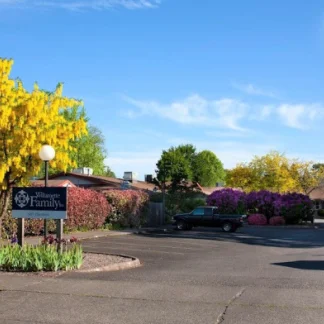Willamette Family - Buckley Center
Buckley Center is part of the Willamette Family, a collection of rehab centers i...
Willamette Family Treatment Services Women’s Residential is a co-occurring substance use disorder drug rehab in Eugene, Oregon. The facility recognizes that the unique needs of women are most effectively treated in a safe and secure “women only” environment.
At Willamette Family Treatment Services Women’s Residential, their dedicated team of professionals offers a safe and nurturing environment where women can find the support they need to overcome challenges.
Understanding the complex relationship between substance abuse and mental health, Willamette Family Treatment Services offers specialized dual diagnosis treatment programs. These programs address co-occurring disorders, providing integrated therapy, psychiatric care, and holistic interventions to support women on their path to recovery.
Willamette Family Treatment Services acknowledges the impact of trauma on women’s lives and incorporates trauma informed care into their treatment approach. Through specialized therapies and trauma focused interventions, they help women heal from past traumatic experiences and develop healthier coping mechanisms.
Willamette Family Treatment Services provides residential treatment programs designed specifically for women. In this supportive and gender specific setting, individuals receive comprehensive care, including individual and group therapy, addiction education, life skills training, and relapse prevention strategies.
Recognizing the importance of a safe and supervised detoxification process, Willamette Family Treatment Services offers medically monitored detoxification services for women in need of support during the withdrawal phase. With medical professionals on hand, individuals receive appropriate care and monitoring to ensure their comfort and safety.
Contact us for more information: (541) 343-2993

Connect with Willamette Family Treatment Services - Women's Residential by calling their admissions team directly.
(541) 343-2993 Website Get DirectionsResearch clearly demonstrates that recovery is far more successful and sustainable when loved ones like family members participate in rehab and substance abuse treatment. Genetic factors may be at play when it comes to drug and alcohol addiction, as well as mental health issues. Family dynamics often play a critical role in addiction triggers, and if properly educated, family members can be a strong source of support when it comes to rehabilitation.
Group therapy is any therapeutic work that happens in a group (not one-on-one). There are a number of different group therapy modalities, including support groups, experiential therapy, psycho-education, and more. Group therapy involves treatment as well as processing interaction between group members.
Trauma therapy addresses traumatic incidents from a client's past that are likely affecting their present-day experience. Trauma is often one of the primary triggers and potential causes of addiction, and can stem from child sexual abuse, domestic violence, having a parent with a mental illness, losing one or both parents at a young age, teenage or adult sexual assault, or any number of other factors. The purpose of trauma therapy is to allow a patient to process trauma and move through and past it, with the help of trained and compassionate mental health professionals.
Group therapy is any therapeutic work that happens in a group (not one-on-one). There are a number of different group therapy modalities, including support groups, experiential therapy, psycho-education, and more. Group therapy involves treatment as well as processing interaction between group members.
Trauma therapy addresses traumatic incidents from a client's past that are likely affecting their present-day experience. Trauma is often one of the primary triggers and potential causes of addiction, and can stem from child sexual abuse, domestic violence, having a parent with a mental illness, losing one or both parents at a young age, teenage or adult sexual assault, or any number of other factors. The purpose of trauma therapy is to allow a patient to process trauma and move through and past it, with the help of trained and compassionate mental health professionals.
Trauma therapy addresses traumatic incidents from a client's past that are likely affecting their present-day experience. Trauma is often one of the primary triggers and potential causes of addiction, and can stem from child sexual abuse, domestic violence, having a parent with a mental illness, losing one or both parents at a young age, teenage or adult sexual assault, or any number of other factors. The purpose of trauma therapy is to allow a patient to process trauma and move through and past it, with the help of trained and compassionate mental health professionals.
Buckley Center is part of the Willamette Family, a collection of rehab centers i...
Center for Family Development is a private rehab located in Eugene, OR. Center f...
Regional Rehabilitation is a private rehab located in Eugene, Oregon. Regional R...
White Bird Clinic – Chrysalis Program is a non-profit rehab located in Eugene, O...